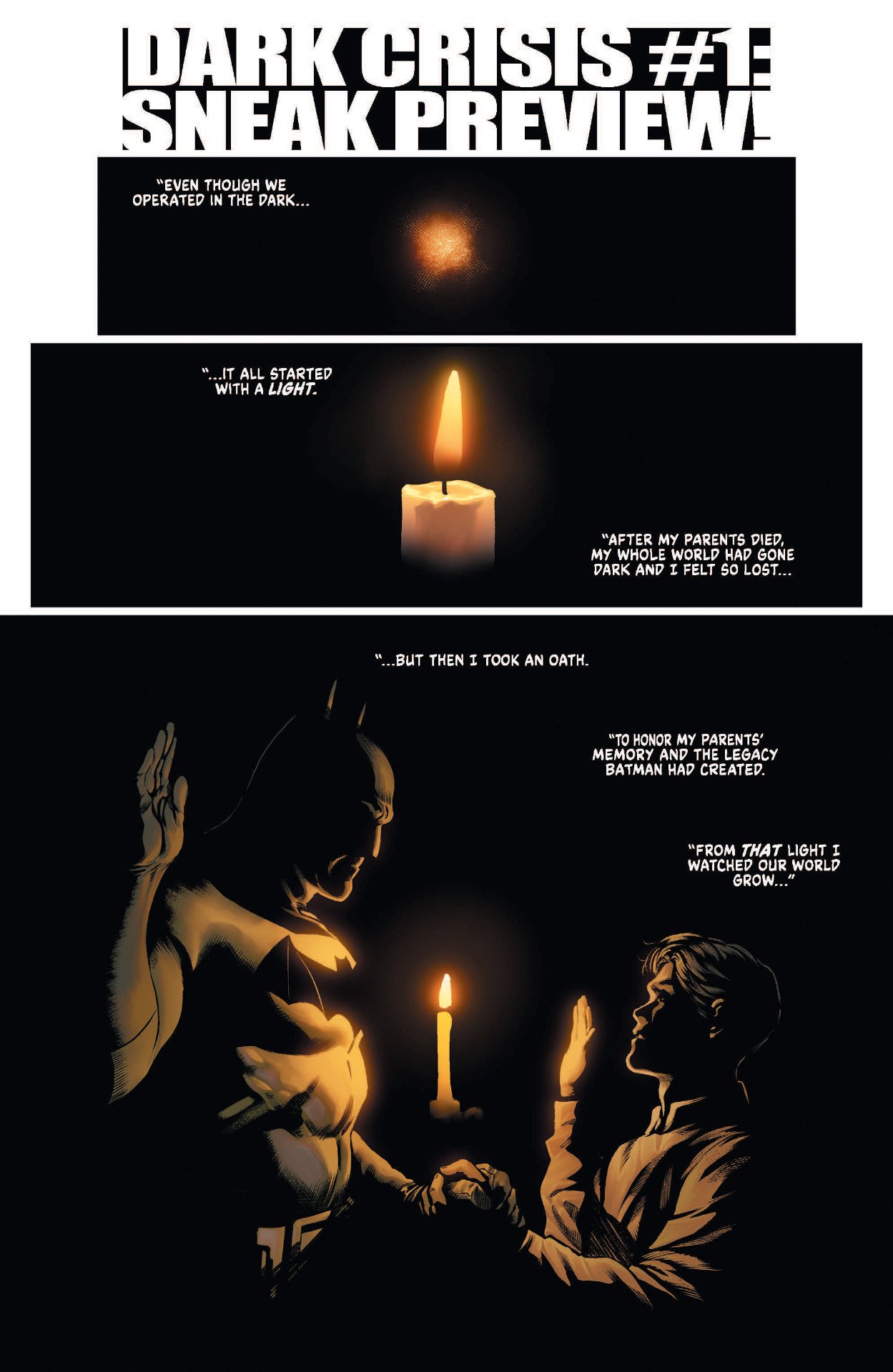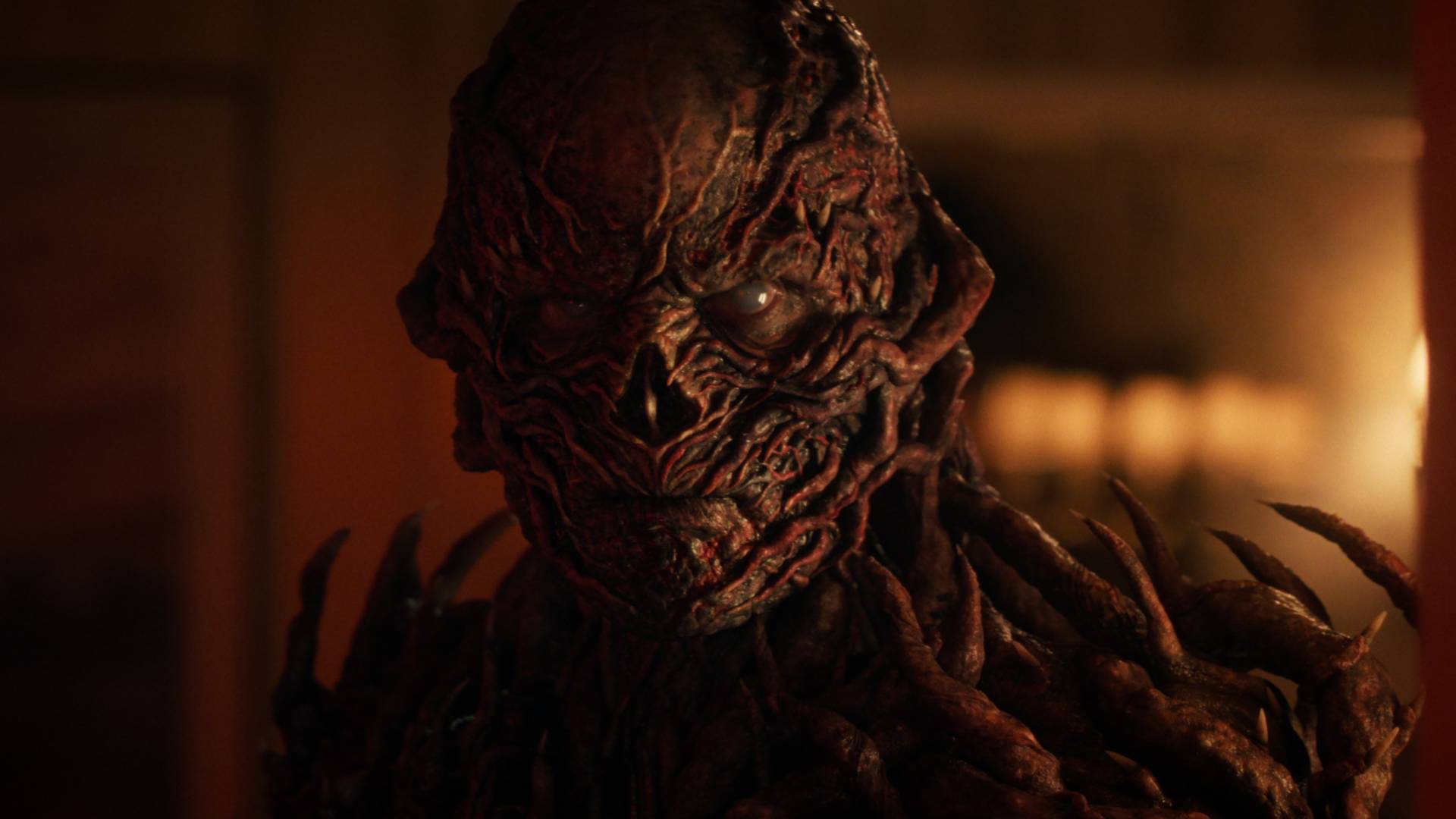Dark Crisis is here, and Williamson and Sampere love every reader theory
Dark Crisis is here, and the Justice League is still dead... right?
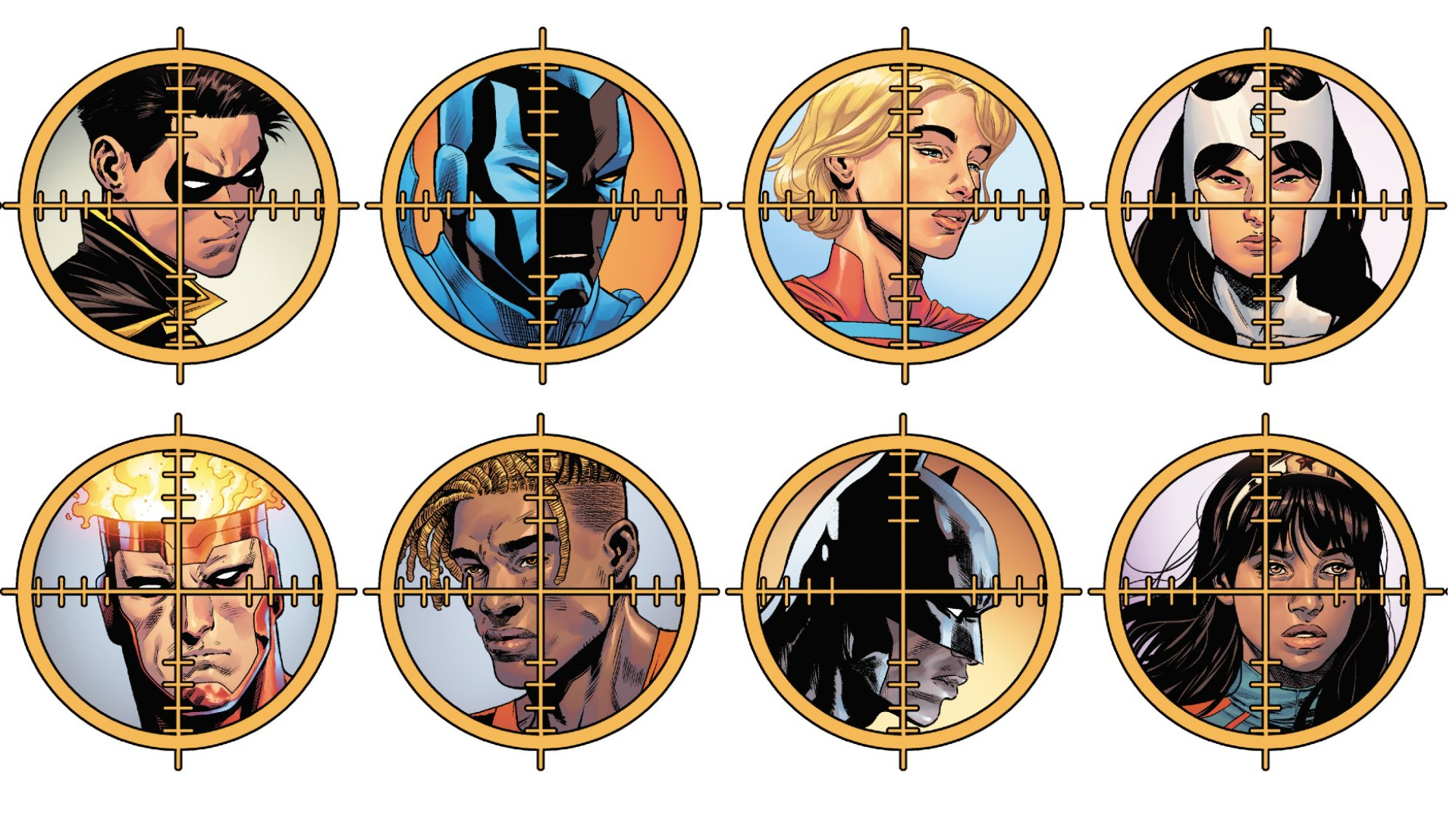
The Justice League is dead. There is no Justice League. But Pariah is building new worlds from the essences of legacy heroes, Nightwing isn't convinced about the deaths of such important figureheads, and the DC Universe is torn over what to believe or where to go next. All of this is the result of Dark Crisis, helmed by writer Joshua Williamson, which debuts today.
As the latest Crisis event begins to rock the DCU, Newsarama spoke with Williamson and Dark Crisis series artist Daniel Sampere about what to expect, what's really going on in Worlds Without a Justice League, the division between legacy and continuity, and their favorite moments in the story so far.
Samantha Puc for Newsarama: Joshua and Daniel, there's been a ton of speculation about the Justice League and their status – but what have people gotten right?
Joshua Williamson: Oh yeah, that's really interesting. In the beginning, I like teasing things out and I like foreshadowing, but I also like to put out incorrect information to get people guessing and talking about it and speculating about it.
Around Dark Crisis #1 being announced, there were two people who nailed it. They just had it. One guy in particular just figured it out immediately, and I was like, 'Oh, man.' But it was funny because I think if you're reading the books – if you read Justice League Incarnate, if you read Infinite Frontier – you knew what we were doing. You knew where things were going.
In issue #1, Black Adam says there's no Justice League, and people try to build Justice Leagues over the course of the series and it just never works out. I think people will be surprised where this book ends when it comes to the Justice League, their place, and what happens with all of those different characters you could call a Justice League. I think people will be really surprised where that lands in the end.
There's some meta messaging throughout Dark Crisis and Justice League #75 and some of the things I wrote before. I wrote Dark Crisis #1 before I wrote Justice League #75, so when I wrote #1 I remember thinking about how people were going to react to the idea that the Justice League was dead. I started putting that in issue #1, and how I've reacted to deaths in comics. I wrote this scene in issue #1 where people are arguing in front of the Hall of Justice about death, and how some people believe it and some don't, and that causes conflict.
Get the best comic news, insights, opinions, analysis and more!
Then we announced issue #75, and the reactions we saw from people were the reactions I put in the book. That was so fascinating, how some people are like, 'Well, death doesn't matter,' although the characters don't necessarily know that. I think as we get deeper into it, people will be surprised in the actual direction of certain things. The speculation is fun because I'm also just grateful people are talking about it and talking about those ideas. People are close, though!
Nrama: In terms of Worlds Without a Justice League, just point-blank, what's going on?
Williamson: In Infinite Frontier #6, Barry actually met Pariah, and then Pariah killed Barry. He Crisis'ed him out. Pariah's realized Earth-0 is considered the Nexus Point of the multiverse and so many things are images splintering out from it. He's realized that if he wants to build a new multiverse, he needs some of that energy. He needs heroes. He needs people who have duplicates, and he needs the Nexus versions of them.
He kills Barry, takes his essence, and builds a new world from that. He creates the Silver Age Barry world, but those worlds are built in someone's image and in some way on their secret desires. [These worlds are like] happiness prisons, in a weird way. Everyone's getting what they want, but it's there to keep them there so Pariah can use them.
He's warned that Justice League Incarnate is going to bring back heroes from Earth-0 to fight him, and he says that's what he wants. He basically Crisis'ed out the Justice League, so he killed them but then he takes their essences to build all these new worlds. That's what all these one-shots are. You have Superman's world, Batman's world, Wonder Woman's, Green Lantern's, and so on and so forth.
Everyone has these fully fleshed-out worlds and it allows us to tell stories on those worlds, like: Do some of them realize they're trapped there? What happens when they realize it? Are some so happy there they never want to leave? There are some who realize what's going on and they remember dying, so they're like, 'Is this heaven for me?' All the characters explore in different ways.
I told all the writers, 'Just have fun. Don't be sad. Have fun and maybe put some new toys in there and explore some stuff.' Some of the designs that have come out of this thing have been really, really cool. Everybody was just able to tell these really fun stories.
They're happiness prisons, so there's a twist to it, right? It can't just be simple. It can't be easy. In some cases, they're trying to escape them, so when they try to escape, those worlds turn on them. The Flash is about Wally taking the whole Flash family to Barry's world to try to free Barry and learning it's not easy. They are the world. It's not just a matter of grabbing and yanking them and dropping them someplace. It's a whole thing.
Like I said before, we want to try to have some surprises in comics and we want to try to have a little bit of misdirection. If people figure it out, that's awesome. That's what I want. That means you had to think about it. Comic book readers are smart people. They will figure it out. So let's just put it out there and let them figure it out. I don't need to hold their hand. I don't need to spoon-feed them.
Nrama: Daniel, are there particular challenges to creating art for a book where the story is still shadowed from the reader?
Daniel Sampere: Everything about this project is a challenge because it's so massive. There are so many characters, so many big moments. One day I'm doing the most epic fight and the next, I have to draw some intimate, very deep moment. It's changing all the time. You need to adapt. It takes a lot of work on the research part to get everything right, and it's super challenging because of the scale and the relevance that the project has, but it's also super fun.
I used to get bored really fast doing things. When you read a comic book, it's super fast, but doing the pages takes a long time. Sometimes, doing a scene that's three or four pages, I feel like I've been in that scene forever and I'm bored. In [Dark Crisis], everything is changing all the time with new characters, new situations, and so it's very challenging to adapt, but at the same time it's super fun to me because it's new challenges all the time.
Nrama: Y'all have said Dark Crisis is focused on legacy and not continuity, but is it possible to have one of those without the other?
Williamson: Yes... The reason I say a very hesitant 'yes' is only because – I've read enough comics that I've picked up and not known anything of the continuity, but I was able to dive in. It's tough. I'm a continuity junkie. I love continuity. I don't have as much of a problem with it as I think some people do and I also think it can be used as a tool, not a crutch. You have to be careful when you use it.
It's a complicated question, because when I go back and look at my introduction to DC – and we're talking about the late '80s, post-Crisis, when legacy and continuity had just become very different – continuity had gone through a massive change only three or four years before I started reading [comics] on a regular basis.
By '91 I was reading every month and by '92, I was going to the comic shop every week. All of these new elements were introduced, and I was able to dive in without knowing anything before. Legacy characters helped bring me into that world. But I also make this joke, because people talk about not liking death in comics, or not liking change necessarily... Then I ask, 'Who's your favorite Robin?' They always say the same thing: 'Tim Drake!' And I'm like, 'Jason Todd died so you could have Tim Drake!'
I think you can do comics about legacy without being crazed about the continuity, necessarily, but they do go hand in hand. I remember reading Green Lantern monthly, but it was this whole mythology, and then Hal gets possessed by Parallax. That was when I really started following, was a few months before that. Then Kyle Rayner shows up and suddenly Kyle Rayner is the POV for an entire Green Lantern universe, and he is being brought into that mythology at the same time that I'm being brought in, so he became my POV.
That's why I feel like legacy characters are so important: They allow us to have new entry points into these massive mythologies. But that's an example where you probably could have picked up Kyle's stuff because he was so brand new, and been okay. There are certain continuities where, to get everything, you have to know it. I think it's complicated.
Nrama: In terms of younger teams like Titans and Young Justice, how do those teams evolve if the Justice League is always looming?
Williamson: Well, that's an interesting question because the Justice League is gone. There is no Justice League. So, do any of those other groups get elevated? Do any of those other groups step up in big ways and become premier teams? Right now, there are no teams in the DCU. But as we get into this, you'll see there will be more teams. Somebody picked up on that, but there will be a lot more soon. With the Justice League gone, it's an opportunity for some characters to try to step up, and for us to see what they're going to do next.
I think a lot of people are going to turn to Nightwing. Nightwing plays such a major role over the course of the book. I have to be careful, because I love talking about things in issue #5 and issue #6 because there are these really big moments to come, you know?
But I'll tell you about this: There is a scene in issue #4 where Alan Scott is talking to Nightwing about what the Justice League means, and the Justice Society, and why everyone is turning to Nightwing. Scott gives him the 'It's time, kid,' speech, and there's some other really cool stuff that takes place after that. But the idea that there's no Justice League and what happens after that with all these different groups is a major part of the story, and where we land at the ending and where we go in 2023.
Nrama: Nightwing is obviously a huge character throughout this, but then Dr. Light has also been named as a major influencing character and Hal has such a legacy of his own. Can you tell us more about the involvement of Dr. Light and/or Hal?
Williamson: Hal is a major, major piece of it. I think we're getting closer to more covers coming out, and you'll see what's going on with Hal. He has his own adventure throughout this story, and without giving away spoilers, the stuff Hal ends up doing is really important. There are a lot of big-time fan moments coming with Hal and Green Lantern.
I wanted to look at every character's interpretation of legacy. Deathstroke hates legacy; he looks down on it. He's a bad person and he's an awful human being and he'll never take responsibility for his own actions. Because of that, he always points fingers at somebody else. So his son died, and he's had all these bad things happen to his children, and it's his fault. To rationalize it, he's come to this conclusion that legacy is bad and no one should ever follow in our footsteps. Look what happens. He's like, 'I'm gonna kill legacy.'
And then you have Wally and Barry, who are obviously very much about legacy. They're building a family out. And then you have Black Adam, who's kind of conflicted on the ideas of legacy because of what had happened to him in the past, and how he's basically lost two families. He has one of the bigger emotional arcs of the whole thing.
And then you have someone like Hal Jordan, who I think, at times, has been reluctant for legacy. At some point, he just totally embraced it. He has all his people with him and he's been very much about bringing in new Green Lanterns. He's not precious about being Green Lantern.
You look at Sinestro, and his arc of, 'I'm the best Green Lantern and I have all the best methods. I'm the greatest Green Lantern, so only my way rules.' That led him to becoming Yellow Lantern. Hal went the opposite direction, where he was like, 'I'm not the only Green Lantern of Earth. You can continue to grow this thing. It doesn't have to be just me and only me.'
I wanted to show that here. He kind of plays this role of somebody who's just, 'Come on, people. Let's go. We're all friends here. Let's go.' He's a little bit of a loose canon sometimes, but he's the one who's like, 'I'm going to find my friends, and I'm going to do it by adding.' Part of legacy sometimes can be adding, not taking away. Hal kind of represents that piece.
Dr. Light, over the course of the series, has a smaller role until we get deeper in. We announced all those one-shots we're doing and one of the one-shots is called The Dark Army. That one has Damian and Dr. Light go on an adventure together to try to figure some stuff out about the Dark Army.
In the process of that, they uncover something about Dr. Light that goes all the way back to the original Crisis on Infinite Earths and her connections to Pariah and her connections to the idea of Crisis. Her origin has weird parallels to Pariah's origins, and I don't think it's ever been fully explored. We learn something about her in that one-shot, and that plays a role way later. It'll be really interesting to see what people think of that, because that will definitely be something that is not only major for Dark Crisis, but for post-Dark Crisis. I mean, her powers are light and it's a Dark Crisis. [Laughs] I feel like it's kind of obvious.
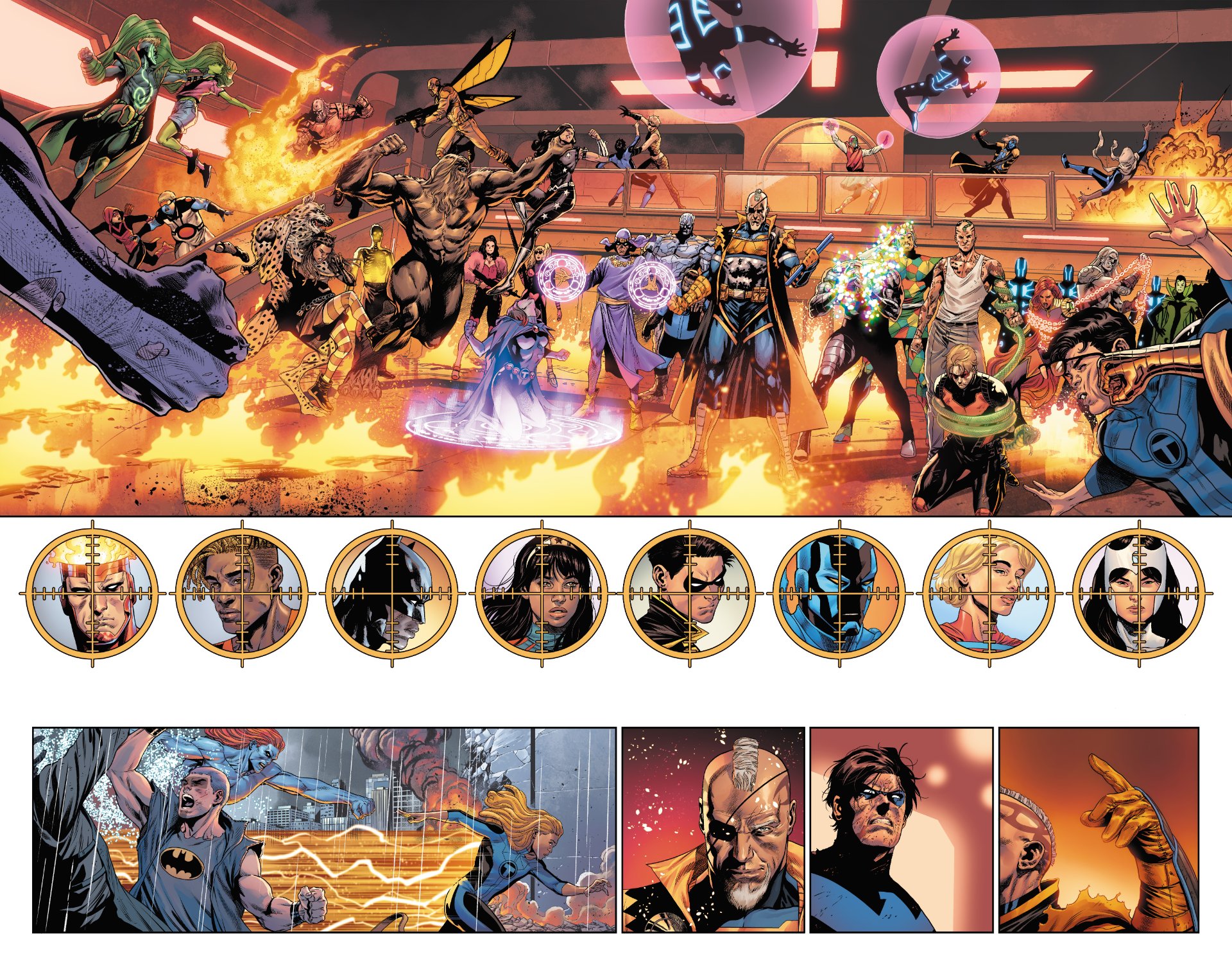
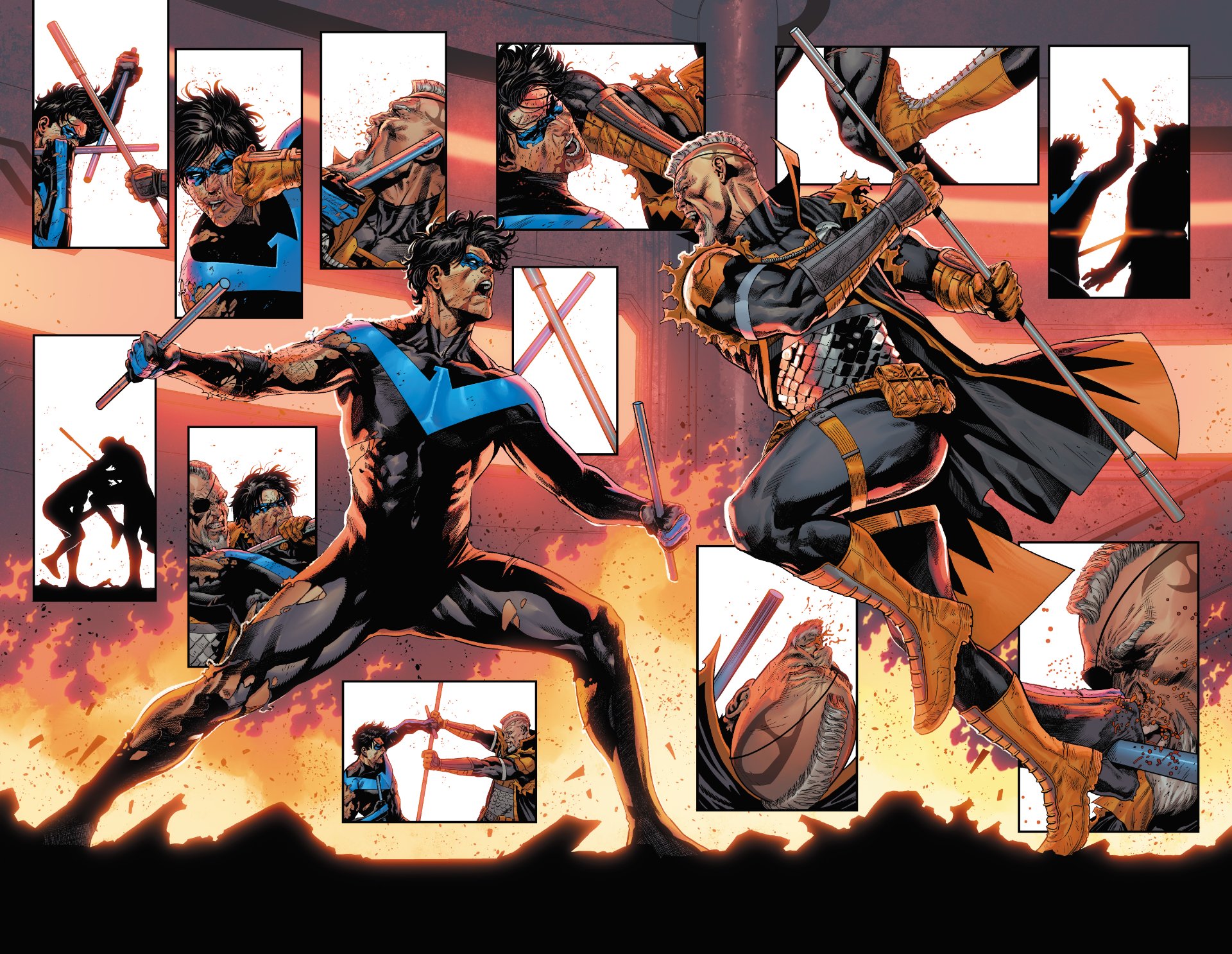
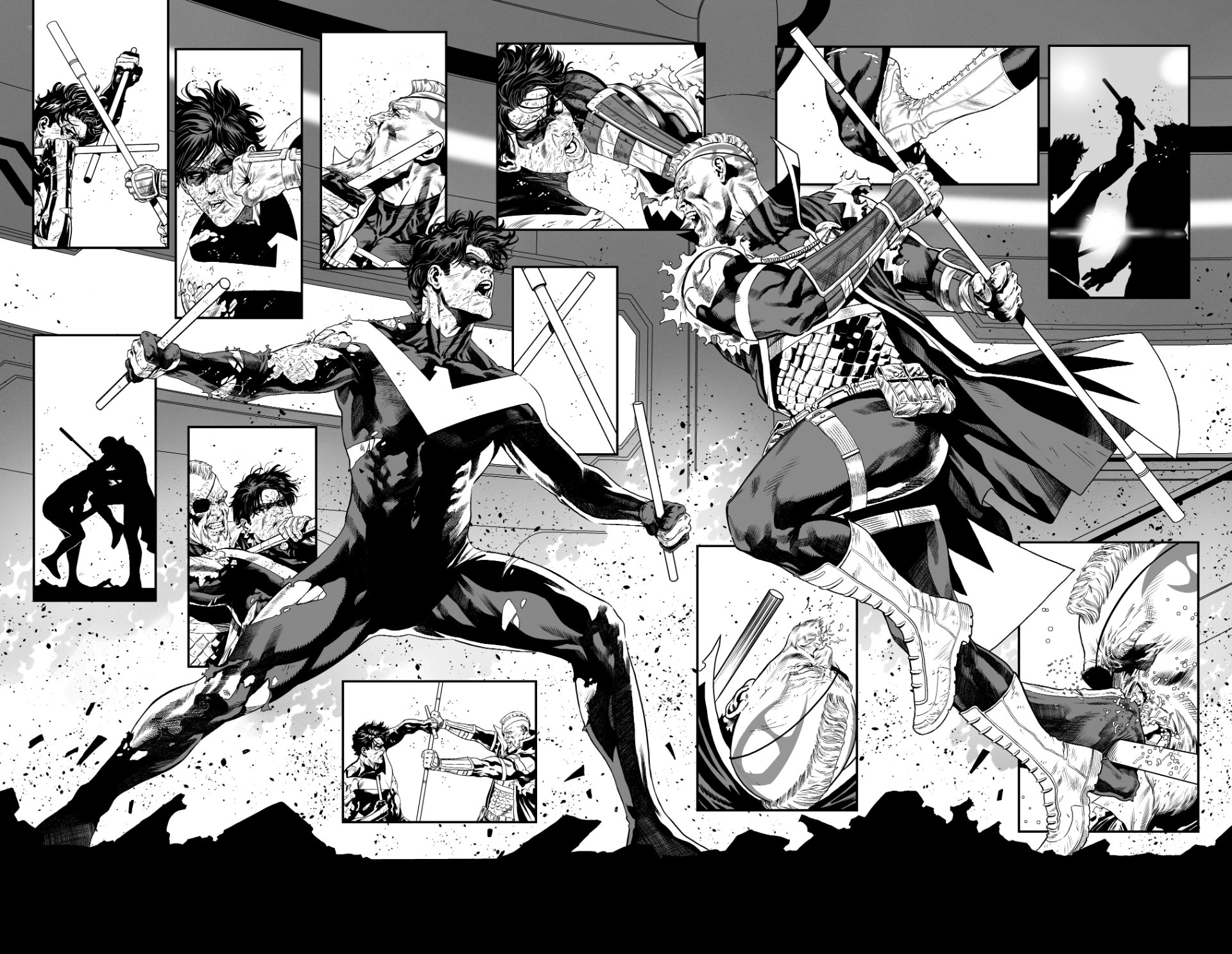
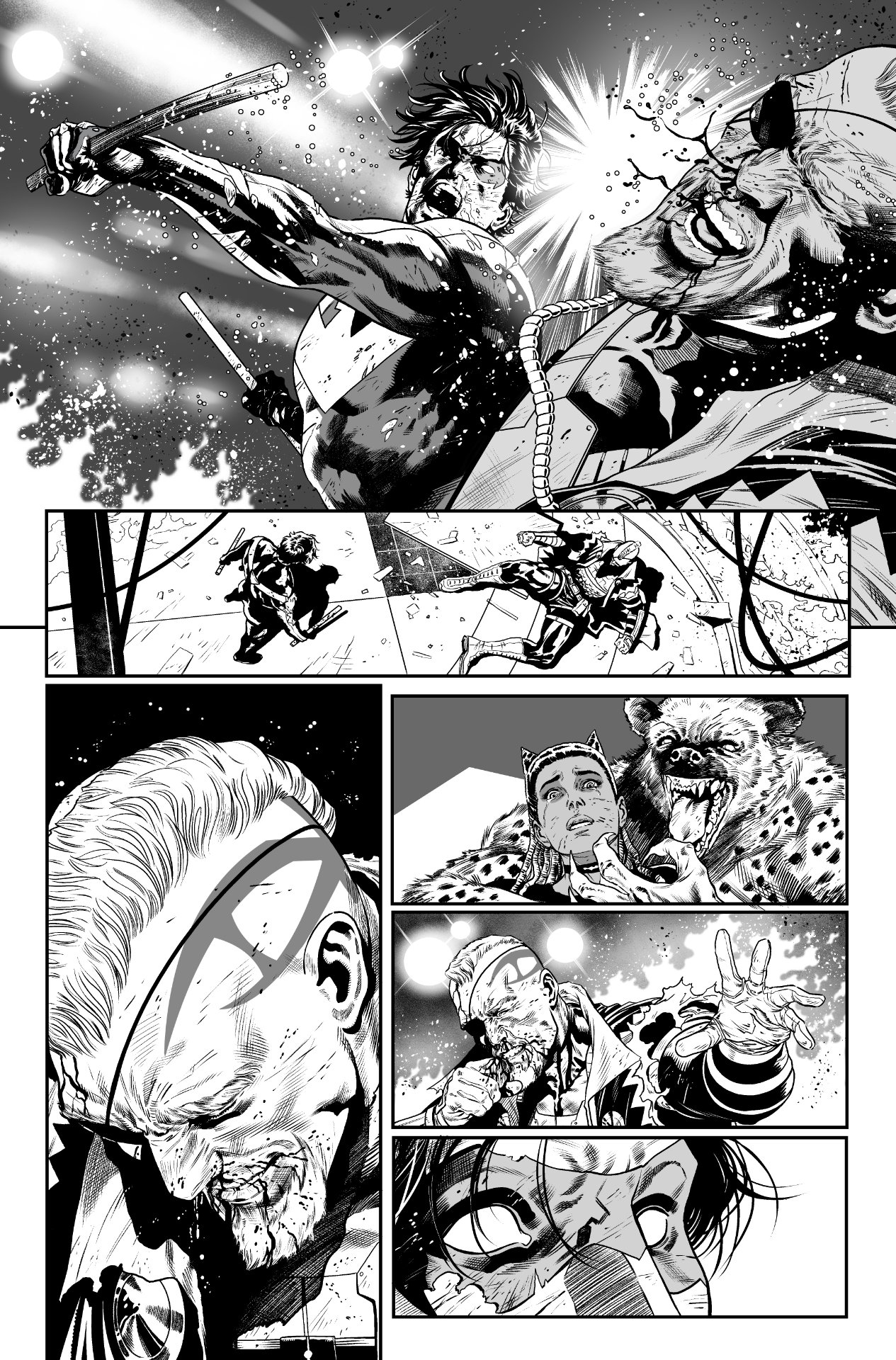
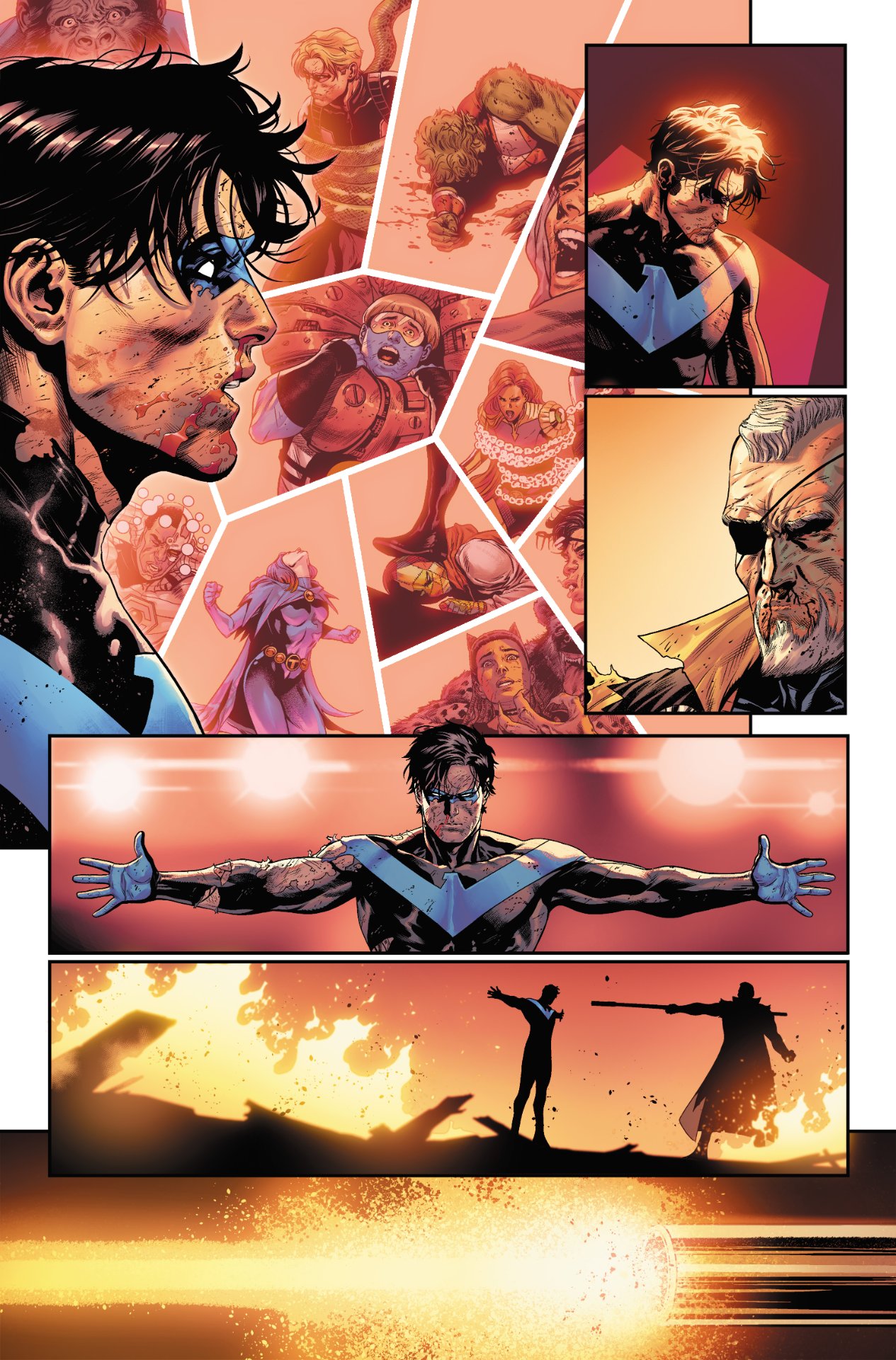
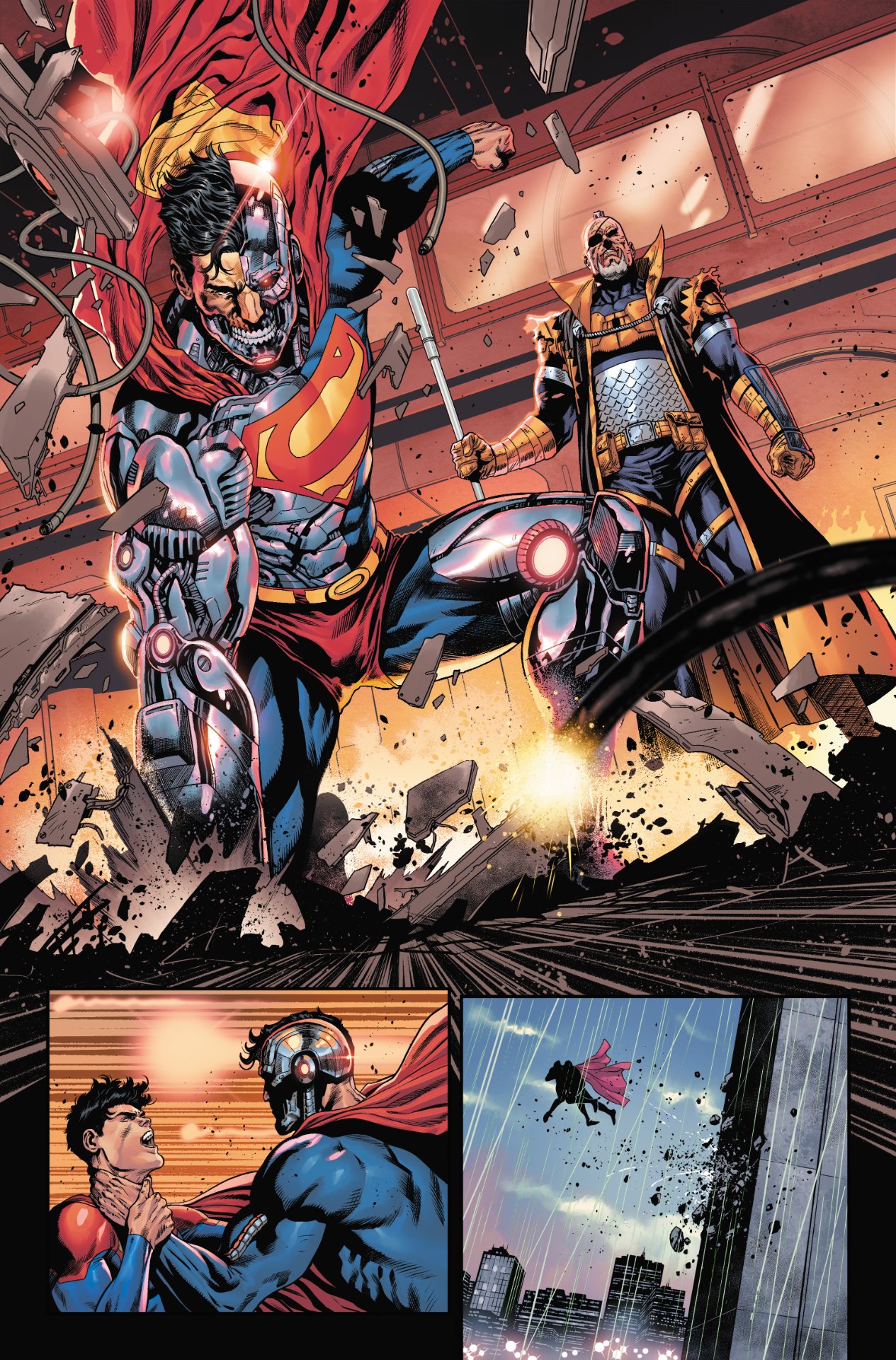

Nrama: Do you have a favorite moment in Dark Crisis so far?
Sampere: This is difficult because I have done a lot of big moments already. I'm proud to say that the series is full of 'Wow!' moments for the fans. Being a DC fan, when I read the script, I'm like, 'Yes! Yes!' every three pages. But yes, I have a very favorite moment, but I cannot tell because we're hiding it.
Williamson: Daniel, Can I guess your favorite moment?
Sampere: Yeah, I think so.
Williamson: Is it the end of issue #2?
Sampere: Yes.
Williamson: Yeah, OK. [Laughs]
Sampere: I think I cannot say, but to me, it was amazing to draw that.
Williamson: There are a lot of moments in this. I want to make sure it's very character-based and how they are handling what is in front of them. It's still a Crisis, and Crisis comes with a certain expectation to be packed. Every issue has to have a lot going on. That's true of this: The deeper we get into it, the more is happening. There's more scenes, more cuts, quicker stuff. It doesn't breathe as much the deeper you get, on purpose, because things are escalating.
But my favorite moment... I have a lot. There's a lot in issue #2 I really like, and some fight scenes I really like. There are some moments in #3 that I think are really cool. There are certain things we keep secret; we've chosen not to reveal certain things. The ending of issue #3 is one I really like. I like the end of issue #2, too, as well, but the ending of issue #3 has a cool moment we've managed to keep secret so far. If only we could keep it secret until the issue comes out.
Sampere: The beginning of issue #1 is one of my favorites too. When I started working on the first spread, I really felt like, 'I'm actually going to go through a crisis.' It was a very big moment for me, and I think it's my other favorite moment for now.
Williamson: I can't believe our first time working together was that opening. I'm glad we had a lot of conversations before. I don't want to say we nailed it, but I feel like we did a good job with our first five pages together. That's pretty bonkers: Our first five pages was me telling you, 'Alright. This first page is the easy one. There's a lot of darkness.' And the next two pages have like a hundred characters on them.
Nrama: When you were conceptualizing Dark Crisis, how did you go about determining which characters would take more of a starring role in these first few issues?
Williamson: I knew Jon, Wally, and Hal – I think some of the roles characters took on came from just plotting things out. The more I plotted out, the more I was like, 'OK, this character is going to be important here. This character is going to have this voice here.' We took all those characters and made sure everyone has their own perspective on what's happening.
Nightwing, I think, was really organic. Jon had a big role. Nightwing had a role, but as I started going deeper into the story, it was like, 'Oh yeah, he plays a major, major role in this.' I went and talked to Tom Taylor and made sure what I was doing didn't mess up anything he was doing with Nightwing and kept in line with the stuff he wanted to do.
But of course, he's the first sidekick. He's the first piece of that legacy moving forward. It made sense that he played a major role. And naturally, the characters are going to look at the Titans. They're going to look at Nightwing. Otherwise, I'd be ignoring the obvious.
Nrama: You're trying to tell a story about the DCU without a Justice League, but then you also have the task of not completely reinventing the DCU. How do you do that?
Williamson: A lot of whiteboards. A lot of me in my head for hours, looking at my notebook, trying to make all these pieces work together. So much of comics is about the idea of change, and it is a hard thing to change these books. But I think the secret is adding to it instead of taking away, and that's what Dark Crisis ends up being about. It's good to keep adding to the mythology instead of making it stagnant and dying. When we get to the ending, you'll see that even with the Justice League gone, we were able to use that to continue to add. You can elevate characters like Dr. Light. You can elevate the Titans. You can elevate characters we haven't seen in a while.
Dark Crisis #1 is available now.
How will Dark Crisis rank among every DC Crisis event ever?

Samantha Puc (she/they) is an editor at Newsarama and an avid comics fan. Their writing has been featured on Refinery29, Bitch Media, them., The Beat, The Mary Sue, and elsewhere. She is currently pursuing a Master of Fine Arts degree in creative nonfiction at The New School.
